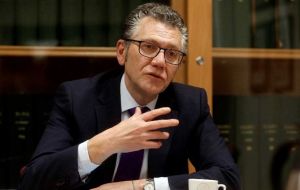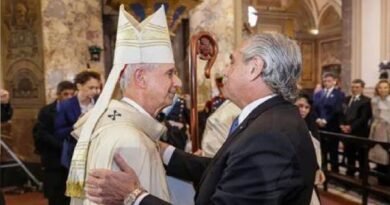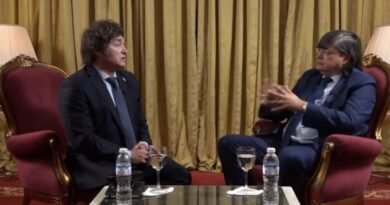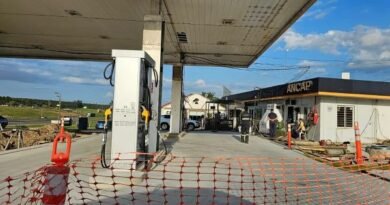Minister Rutley’s second visit to the Falklands in a month: big changes in South Atlantic fisheries policies?
[ad_1]
Minister Rutley’s second visit to the Falklands in a month: big changes in South Atlantic fisheries policies?
Some Falklands lawmakers meet with minister Rutley at Gilbert House

Javier Touza, worried about policy changes from the new Argentine government that could affect Galician interests
Foreign Office minister for the Americas, Caribbean, and Overseas Territories David Rutley has been to the Falkland Islands again this week, the second visit in a month, and in the meantime this did not prevent him from on December 10, to represent the British government in Buenos Aires for the taking office ceremony of Argentine extreme liberal president, Javier Milei.
Given Milei’s windfall victory in the runoff over Kirchnerite candidate Sergio Massa, 55,6% to 44%, a new mood prevailed in the Argentine capital and there was no outburst of aggressive nationalism towards the ‘English’ delegation, minister Rutley and ambassador Kirsty Hayes, rather the contrary, it was one of the few representations that later held a private meeting with foreign minister, US educated, English speaking Diana Mondino.
On his second trip to the Falklands, Rutley met with the elected members of the Legislative Assembly and aired a timid conspicuous message, Very grateful to meet with Falkland Islands Legislative Assembly members today to discuss our enduring partnership, and to learn from @SAERI_FI about their world class science research supporting conservation in this unique environment
No disrespect for scientific SAERI tenacious and successful research production, but a double visit in a month ahead of an election year in UK, is too light a motive. Maybe we should listen to what the Galician fishing lobby from Vigo is saying about the new Argentine government and its desperate efforts to have the country back on its feet, and promoting all industries which can generate hard currency for an almost empty Central Bank and facing a possible major default.
In effect the Galician media, converging with the fishing industry lobby fears some of the alleged intentions of the new Milei administration such as possibly imposing a fee on fish exports or even worse opening up the Argentine EEZ to all fishing vessels that comply with domestic legislation, exposing them to the same conditions as Argentine vessels, or joint Argentine/Spanish companies vessels. For example Nueva Pescanova, Iberconsa, Profand or Wofco.
We have to many Galician fisheries interests and investments in Argentina, not only vessels, but also processing plants and freezing facilities, Javier Touza from Vigo vessel owners cooperative was quoted. Although the extent of the omnibus bill sent by Milei to Congress, some 180 pages and 664 articles, is only becoming to be known, and turns effective until it is rejected or taken to court, we must follow closely events, it’s a time of important changes in Argentine politics, insisted Touza.
It is believed the fee on fisheries exports, a tentative 15%, by companies with Galician interests could reach a revenue of some US$ 50 million. The Argentine fishing industry released a joint reply complaining that such a measure, would have a great negative impact on all fisheries activities.
But even more daring included in the Decree of Necessity and Urgency is the alleged end of Argentina’s EEZ rights for Argentine flagged vessels. Apparently the new licensing can’t have a different treatment because of the origin of the vessels, its seniority or labor employed, or the conditions of the owners or companies to which the vessels belong. Galician fear the Decree could open the door to other fishing heavy weights such as the Chinese.
Although not a word leaked of the private talks between Ms Mondino and the UK delegation headed by Rutley in early December in Buenos Aires, or what the message was to the Falkland Islands elected representatives, big changes seem ahead in the South Atlantic and for Argentine fisheries policies.
[ad_2]
Source link




